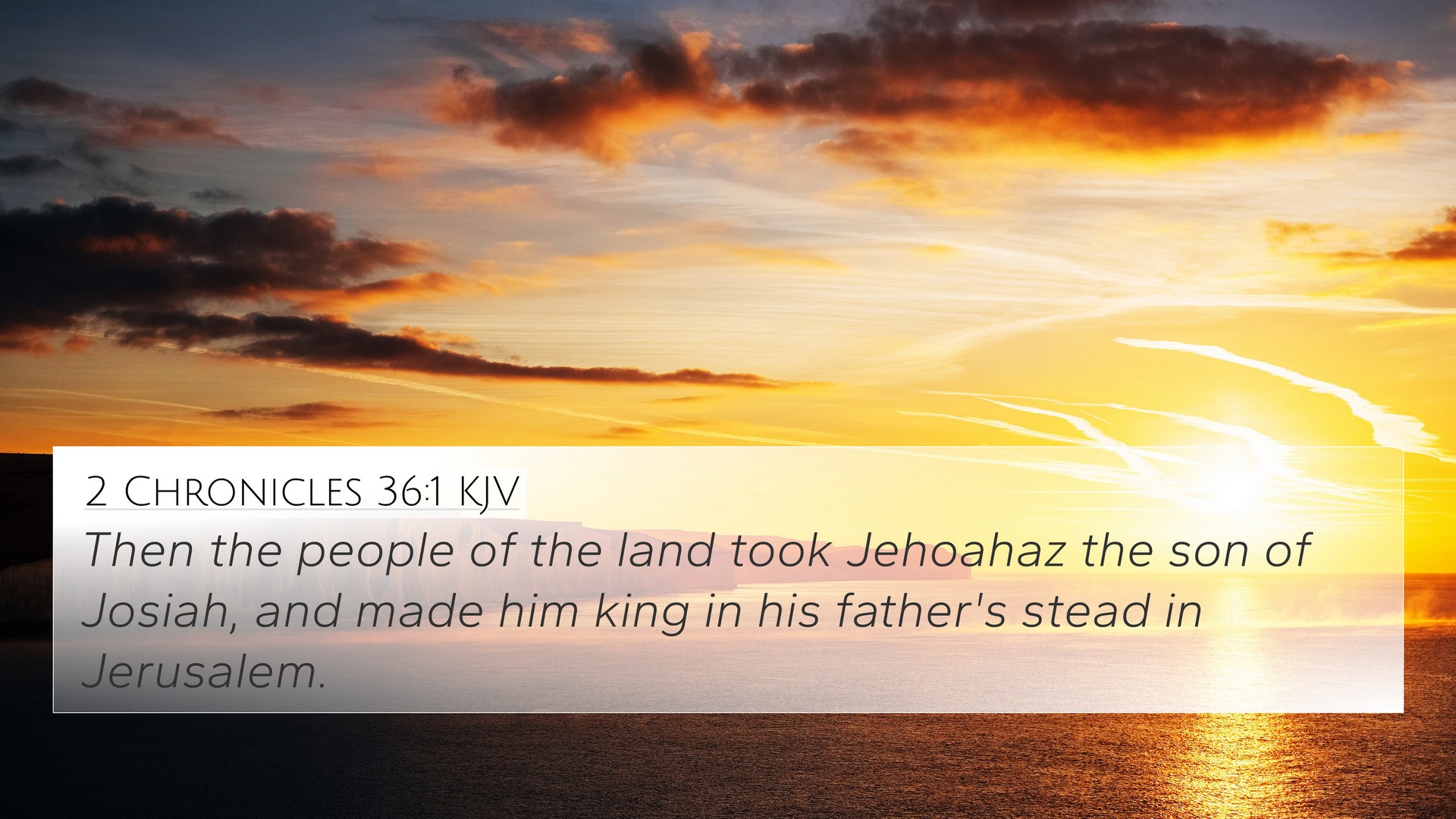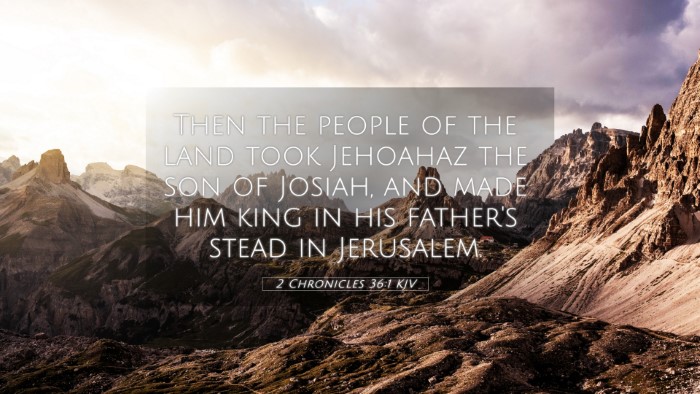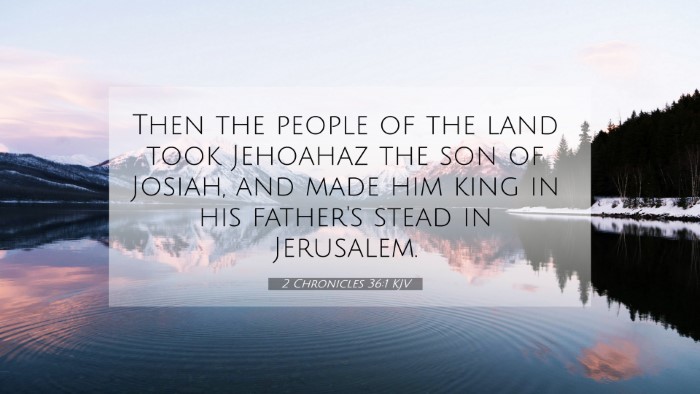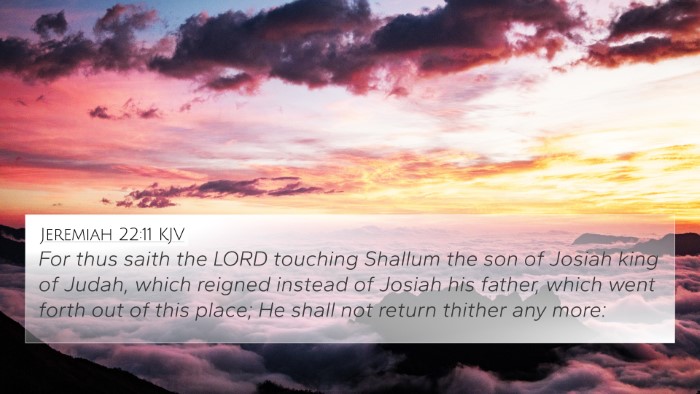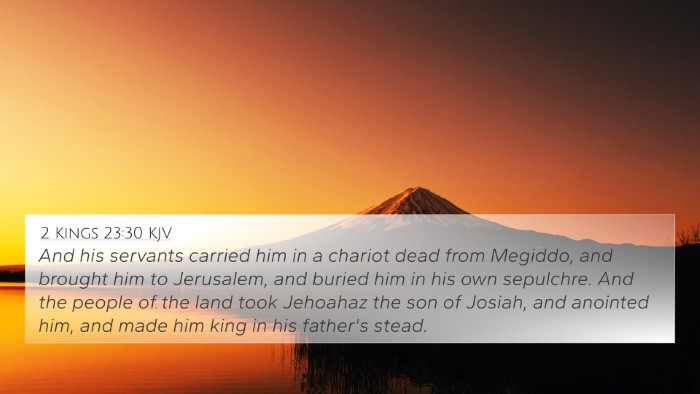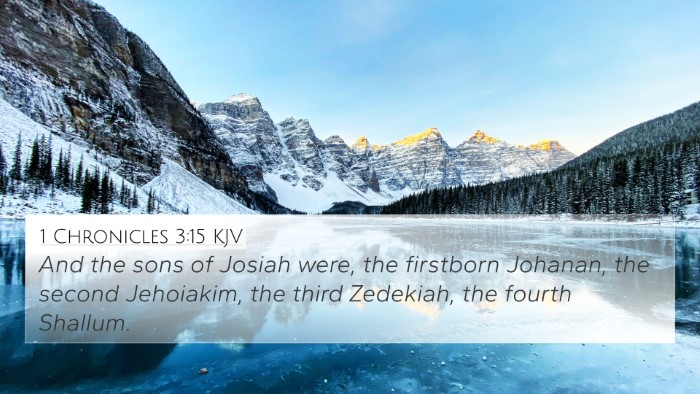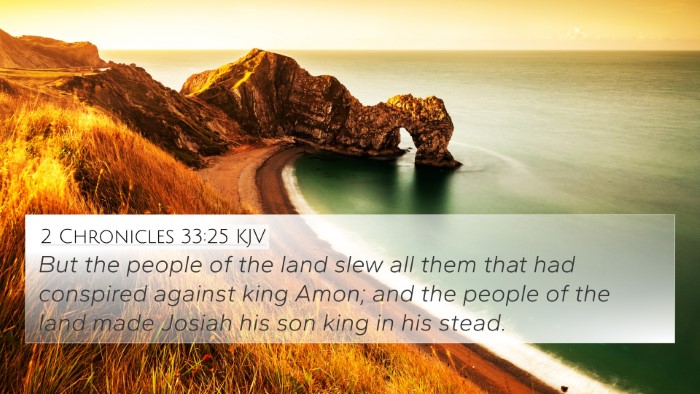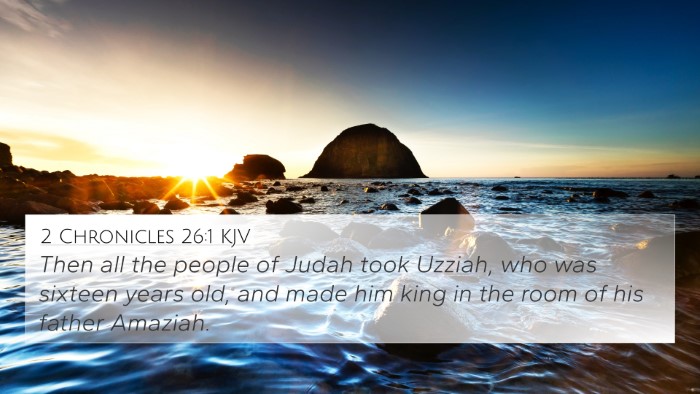Understanding 2 Chronicles 36:1
Verse Reference: 2 Chronicles 36:1
“And the people of the land took Jehoahaz the son of Josiah, and made him king in his father's stead in Jerusalem.”
Summary of the Verse
This verse marks a significant moment in the history of Judah, highlighting the transition of power following the death of king Josiah. It emphasizes the role of the people in leadership decisions, and introduces Jehoahaz, a king with a notable lineage but with potential implications for Judah's future.
Commentary Insights
Exploring the perspectives from Matthew Henry, Albert Barnes, and Adam Clarke provides a deeper understanding of this passage.
- Matthew Henry’s Commentary:
Henry interprets this verse as indicative of the people’s response to the death of Josiah, suggesting that the selection of Jehoahaz reflects a certain instability in leadership. He characterizes Jehoahaz as a temporary solution, foreshadowing the eventual downfall of Judah due to the choices made during this transitional period.
- Albert Barnes’ Commentary:
Barnes notes the historical context wherein the people of Judah felt empowered to choose their ruler. He suggests that this act demonstrates a rejection of divine order, as the appointment lacked God’s endorsement, contrasting with the earlier reign of Josiah, which was marked by reform and divine favor.
- Adam Clarke’s Commentary:
Clarke highlights the significance of Jehoahaz’s name, meaning “Yahweh has seized,” implying a divinely inspired action albeit with negative consequences. He points out the vulnerability of the kingdom and the poor choices that will lead to its eventual exile, emphasizing the need for strong and righteous leadership.
Bible Cross-References
This verse connects with several significant passages in the Bible that explore themes of leadership, divine sovereignty, and the consequences of the people's choices:
- 2 Kings 23:30: Discusses the aftermath of Josiah's death and the impact on Judah’s leadership.
- Jeremiah 22:10-12: Offers a prophetic perspective on the legacy of Josiah’s descendants.
- 1 Chronicles 3:15-16: Details the genealogical context of Jehoahaz as a king from Josiah’s lineage.
- 2 Chronicles 33:9: Provides background on the corrupt leadership that followed Josiah, underscoring the cyclical nature of Judah’s kings.
- Proverbs 29:2: A general principle regarding the responsibility of rulers to govern justly, relevant to Jehoahaz's kingship.
- Isaiah 1:23: Critiques the leaders of Judah, emphasizing the need for justice and righteousness in governance.
- Zechariah 8:10-12: Promises restoration and just leadership, contrasting with the situation during Jehoahaz's reign.
Thematic Connections
This verse can be related to wider themes within the Bible concerning:
- The Role of Authority: Examining how authority is established and the impact of leadership on a nation.
- Consequences of Choices: Reflecting on how the collective choices of the people affect their destiny.
- Divine Sovereignty vs. Human Agency: The tension between God's plans and human actions as seen through the history of Israel.
Comparative Bible Verse Analysis
Through cross-referencing, one can analyze how 2 Chronicles 36:1 interacts with other Scripture texts:
- Examine leadership in Exodus 18:21 where Moses is advised to appoint leaders over the people.
- Contrast with Matthew 20:26-28 which redefines leadership as servanthood.
Tools for Bible Cross-Referencing
Utilizing tools like a Bible concordance or cross-reference guide can enhance understanding of verses like 2 Chronicles 36:1:
- Bible concordance: Identify where similar concepts or names appear throughout Scripture.
- Bible cross-reference guide: Provides a systematic approach to finding related verses.
- Bible chain references: Helps track themes and topics across various Biblical texts.
User Intent: Finding Related Verses
For those wondering, “What verses are related to 2 Chronicles 36:1?”, consider exploring:
- Similarities between Jehoahaz and other leaders like Jehoiakim (2 Kings 23:34) and their impact on Judah.
- How do the prophecies from Jeremiah relate to the events surrounding 2 Chronicles 36:1?
- Identify connections to the autonomy of the people in leadership choices compared to divine appointments in 1 Samuel 16.
Conclusion
This thorough exploration of 2 Chronicles 36:1 brings to light the dynamic interplay between human decision-making and divine providence. By studying this verse alongside cross-references, believers can gain deeper insights into the lessons of leadership, accountability, and the continual need for righteousness among God’s people.
